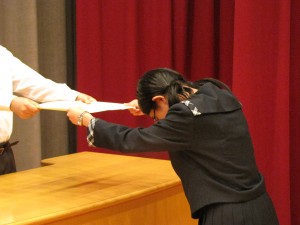| 10月5日(水)におこなわれた鶴ヶ島・越生・毛呂山地区英語スピーチコンテストに、校内スピーチコンテスト入賞者の3年1組間島歓くん、3年2組川崎尚子さん、3年3組丹場ひかるさんが出場しました。
それぞれの想いをこめた2000字以上のスピーチを暗唱するため、8月から練習を重ね、丹場さんが見事優勝、川崎さんが5位に入賞しました。 丹場さんは、鶴ヶ島・越生・毛呂山地区の代表として、10月19日(水)におこなわれた第63回埼玉県中学校英語弁論大会に出場しました。 惜しくも入賞は逃しましたが、5分という制限時間の中、自分の想いを伝えるために力を出し尽くしました。 |
 |
What Is Japanese Culture?
Hikaru Tamba
What do you think Japanese culture is? Is it a tea ceremony, sushi or Geisha, perhaps?
In June I had a chance to visit an Australian student when I went to Australia on a school excursion. Justina was my buddy and had blond hair and blue eyes. I thought she was so beautiful. I was excited at the prospect of speaking with her. I asked her, “Do you like your Japanese class?” and she answered, “Yes, it’s my favorite subject.” I was happy to hear that, and I thought we could talk about Japanese culture. I asked her if she knew about tea ceremonies, sumo wrestling, kimonos and so on. She answered my questions, but clearly she didn’t seem to be very interested in them. She simply said, “Yeah.” Gradually, I grew annoyed with her behavior and was at a loss for words. There was a short and slightly uncomfortable silence between us. During which I thought to myself, “I don’t want to be here anymore!”
Suddenly one of her friends came to us with some music playing through her cell phone. I had never heard that music before. My buddy said, “This is music from Japanese animation, you know. We are cosplay fans, too. And on weekends we dress as our favorite anime characters. This is a picture of us in costume. What do you think?” Their eyes twinkled as they talked. I was very surprised! I wasn’t very interested in comics or animation and I didn’t know about cosplay at all. But my friend who was with me at that time knew their favorite characters well. They talked to my friend a lot about Japanese animation, even though my friend wasn’t good at speaking English. Manga and anime were what Japanese culture was for them. I hadn’t known that at that time. How foolish I was! Afterwards, looking about me, I had noticed there were many people wearing character goods. I was impressed by that fact.
After the school excursion, I did a little research and found Japanese comics and animation are really popular outside Japan. Naruto, One Piece, and Pokemon are especially famous Japanese animation. If you leave Japan, you’ll be able to watch some of these or others on TV. Actually, “manga”, “otaku” and “anime” are Japanese-English, so you can use these words in other countries as well.
From this experience I realized two things: Firstly, manga and anime are identified as a large part of Japanese culture. I had a traditional image of Japanese culture. And so what I experienced in Australia taught me that traditional views are not always what other people think of. I was ashamed not to have known that. Secondly, it is useful to be able to speak English, but it alone is not always enough. In fact my friend could talk to the Australian students better than I, even though she was not a good English speaker. She could however relate to them. That helped bridge the gap.
In the end, having a large stock of knowledge and experience makes it easier to communicate with various people. So then, of course we must learn English and about foreign countries. But we must remember English is just a tool for communication. And that we should also learn to relate to others. To do this, we should keep an open mind as well as occasionally look at our own culture from another point of view. With these in mind, we all can be great communicators, not simply good English speakers.












